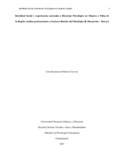Please use this identifier to cite or link to this item:
https://repository.unad.edu.co/handle/10596/42659Full metadata record
| DC Field | Value | Language |
|---|---|---|
| dc.contributor.advisor | Ceballos Villada, Zeneida Rocío | |
| dc.coverage.spatial | cead_-_chiquinquirá | |
| dc.creator | Pedreros Cuevas, Lina Esperanza | |
| dc.date.accessioned | 2021-10-12T21:45:39Z | |
| dc.date.available | 2021-10-12T21:45:39Z | |
| dc.date.created | 2021-09-22 | |
| dc.identifier.uri | https://repository.unad.edu.co/handle/10596/42659 | |
| dc.description.abstract | El presente trabajo de investigación, está enfocado en la comprensión de los vínculos existentes entre Identidad Social y las experiencias asociadas a bienestar psicológico en mujeres y niñas de los territorios rurales de región Andina colombiana, en este caso particular, del municipio de Buenavista, en el departamento de Boyacá. En el plano metodológico, su diseño corresponde a un estudio cualitativo, etnográfico, que logra dar cuenta de diferentes categorías de análisis relevantes para el objetivo de la investigación como son: roles, emociones, valores y normas, todas ellas abordadas desde la perspectiva de la Psicología comunitaria. La población tenida en cuenta comprendió niñas, mujeres y hombres del sector rural del municipio de Buenavista, con los cuales se aplicó la entrevista estructurada como instrumento de recolección de la información. Dentro de los hallazgos de la investigación se tiene que las percepciones negativas de las mujeres rurales respecto a su bienestar están enfocadas claramente a una situación específica y es la hegemonía masculina que genera sentimientos de rabia, miedo, tristeza o frustración en ellas. Estas concepciones tienen que ver con relaciones de género y poder que no han podido superarse y que resultan en que persista la desigualdad en el acceso a la propiedad de la tierra, a la equidad en la distribución del poder en la toma de decisiones y en la manera en que se valora el trabajo de la mujer. Sin embargo, aunque hay mucho camino por recorrer hacia la igualdad en cuanto al reconocimiento de derechos y aportes de las mujeres rurales, los cambios han sido positivos de cara a permitir gradualmente una mayor libertad de expresión y participación, no sólo en lo que respecta a sus opiniones, sino a sus comportamientos públicos y la manifestación de sus emociones, una situación que se reconoce por toda la comunidad y se alude a ella como una transformación positiva que beneficia a las nuevas generaciones, permitiendo dinámicas más equitativas y nuevos diálogos socioculturales. | |
| dc.format | ||
| dc.title | Identidad social y experiencias asociadas a bienestar psicológico en mujeres y niñas de la región andina pertenecientes a sectores rurales del municipio de Buenavista – Boyacá | |
| dc.type | Proyecto de investigación | |
| dc.subject.keywords | Bienestar, identidad cultural, Mujer, niña, Región andina | |
| dc.description.abstractenglish | This research work is focused on understanding the existing links between Social Identity and the experiences associated with psychological well-being in women and girls from the rural territories of the Colombian Andean region, in this particular case, from the municipality of Buenavista, in the Boyacá department. On the methodological level, its design corresponds to a qualitative, ethnographic study, which manages to account for different categories of analysis relevant to the objective of the research such as: roles, emotions, values and norms, all of them approached from the perspective of the Community psychology. The population taken into account comprised girls, women and men from the rural sector of the Buenavista municipality, with whom the structured interview was applied as an instrument for collecting information. Among the research findings, the negative perceptions of rural women regarding their well-being are clearly focused on a specific situation and it is the male hegemony that generates feelings of anger, fear, sadness or frustration in them. These conceptions have to do with gender and power relations that have not been overcome and that result in the persistence of inequality in access to land ownership, equity in the distribution of power in decision-making and in the way in which women's work is valued. However, although there is a long way to go towards equality in terms of the recognition of the rights and contributions of rural women, the changes have been positive in order to gradually allow greater freedom of expression and participation, not only in terms of their opinions, but rather their public behaviors and the manifestation of their emotions, a situation that is recognized by the entire community and is referred to as a positive transformation that benefits new generations, allowing more equitable dynamics and new sociocultural dialogues. | |
| dc.subject.category | Psicología comunitaria | |
| Appears in Collections: | Maestría en Psicología Comunitaria | |
Files in This Item:
| File | Description | Size | Format | |
|---|---|---|---|---|
| lepedre.pdf | 864.17 kB | Adobe PDF |  View/Open |
Items in DSpace are protected by copyright, with all rights reserved, unless otherwise indicated.
